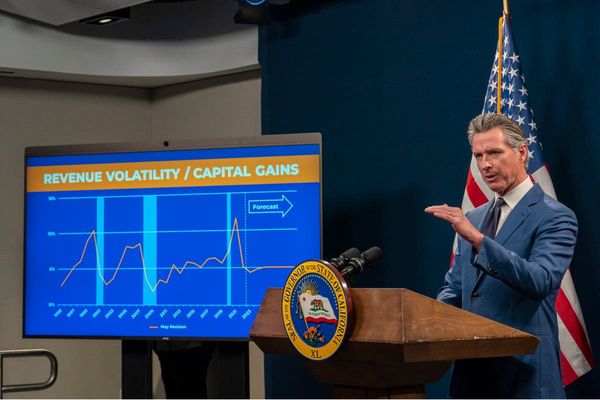Inside the emergency department of Tasmania's biggest hospital, health workers are doing their best but are operating in "awful conditions" in a system that is failing them, an emergency medicine doctor says.
A rare code yellow was declared at the Royal Hobart Hospital (RHH) this week, and remains in place, signifying an internal crisis that affects service delivery.
"We've been in a precarious situation for a long time … but the code yellow was essentially a plea for help," Australasian College of Emergency Medicine Tasmania chairman Juan Ascencio-Lane said.
Dr Ascencio-Lane said access block — which happens when there are not enough beds on wards for patients to be moved from the emergency department (ED), which means patients who need to be admitted are waiting longer — was doing harm.
"No one wants to watch elderly patients, who are so confused and disorientated from being stuck in the ED for days and days, due to a lack of spaces in care or hospital, [who] must be sedated," he said.
He said the noise, light and activity in the ED could be difficult for elderly patients to cope with and could affect their sleep patterns. Sedation was happening more because of the demand on the hospital, he said.
"Certainly with access block and overcrowding in the emergency department, it is something that unfortunately is seen more frequently — not just in Hobart, but across Launceston, Burnie and Mersey [hospitals], as well as across Australia and New Zealand.
"It certainly is one of the evils of access block … and it is something that should be preventable."
While the RHH ED will not turn anyone away, people who can seek treatment elsewhere are asked to do so, and those whose lives are not immediately in danger are warned that wait times have blown out.
"I've seen patients waiting in the waiting room for prolonged times, poor mums coming up to the front asking when the bed is going to come up next and the poor nurses are trying their best and the best they can say is 'a few hours', but nobody should have to wait that long with their little baby that needs that bed," Dr Ascencio-Lane said.
"The staff keep pushing and pushing, and pushing and it's a huge testament to them; how well a lot of these patients are being cared for despite the awful conditions that we work through.
"But you see them breaking down, and I've seen staff hanging their heads down after a long shift feeling they haven't done their best for their patients, being absolutely heartbroken. And that's one of the hardest things that you see."
Playing 'bed Tetris' to manage patients
Dr Ascencio-Lane said a "perfect storm" of some health services being scaled back over the Christmas period and some patients having difficulty accessing health care outside the hospital, the burden of COVID-19 on the hospital, and an increase in acute presentations all led to the code yellow.
He said it was the people on the ground who kept the health system afloat, "but they're faced with this unbelievable task of trying to work in a system that is failing them".
"I see paramedics working overtime and getting called back to work without rest. I see them care for patients on the ramp when the hospital is too full for up to 16 hours, and I see them looking after groups of patients to let the ambulances get back onto the road to collect more sick and injured people.
"I see hospital inpatient teams forced to care for patients in the waiting room, instead of in a private space, whilst still showing complete compassion and professionalism."
He said a team of nurses had to play "bed Tetris" to try to manage all the sick patients.
Dr Ascencio-Lane said he did not want to lay blame.
"This is no one's fault, but it is everybody's responsibility to fix. We are struggling now across the state because of poor decisions made over 10 years ago. The Tasmanian Department of Health is engaged, but struggling as we go from one crisis to the next."
He said the current challenges required a greater level of leadership and collaboration to address.
"We know this won't be easy. But it is possible. We have the medical and health leadership. We have the will. We have the ideas. We just need resources and political support."
RHH Staff Association chairman Frank Nicklason told ABC Radio Hobart reforms needed to consider the health system in its broadest form: "There's a crisis in general practice as well, and that needs to be addressed."
He said, "talking with people and listening very carefully and respecting what comes from people on the front line" of the health system was important.
Tasmanian Health Department secretary Kathrine Morgan-Wicks again thanked all RHH staff members on Friday afternoon, including those scheduled to be on duty and those who have returned to work from leave.
"There continues to be significant demand for services at the RHH and for Ambulance Tasmania assistance throughout southern Tasmania and we again ask communities in this region for their patience and understanding should they experience longer waiting times for non-urgent presentations," Ms Morgan-Wicks said in a statement.







